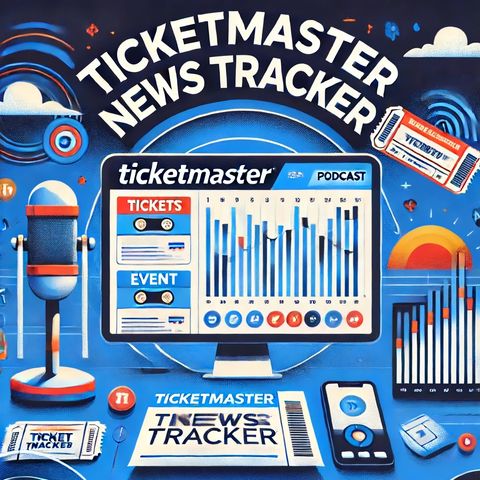Ticketmaster Takeover: Calls for Breakup Amid Anti-Competitive Concerns

Download and listen anywhere
Download your favorite episodes and enjoy them, wherever you are! Sign up or log in now to access offline listening.
Jun 20, 2024 ·
3m 26s
Ticketmaster and its parent company Live Nation have been at the center of public and regulatory scrutiny for years, frequently criticized for their dominant position in the live events market....
show more
Ticketmaster and its parent company Live Nation have been at the center of public and regulatory scrutiny for years, frequently criticized for their dominant position in the live events market. With recent calls by high-profile figures such as Attorney General Merrick Garland suggesting a breakup could be on the horizon, discussions around the implications for competition and consumer choice in the multi-billion-dollar ticketing industry have intensified.
Live Nation and Ticketmaster merged in 2010, creating a behemoth that drastically altered the landscape of live event ticketing and promotions. This merger granted them overarching control over much of the live entertainment process, including venue management, artist management, and ticket sales. The integration of these services under one roof, while arguably efficient for the company, has led to numerous complaints about anti-competitive practices, high fees, and a poor customer experience.
One of the most telling signs of their market dominance is the overwhelming outcry from fans and artists alike during high-demand ticket sales events. A notable example being the sale of tickets for Taylor Swift's Eras Tour, which led to a massive public uproar due to system outages and insufficient ticket availability, purportedly caused by overwhelming demand yet exacerbated by Ticketmaster's platform limitations. This incident refueled discussions about the need for regulatory reform or a company breakup to foster competition.
In proposing the breakup of Live Nation-Ticketmaster, advocates argue that dismantling the union could lead to several potential benefits. Firstly, it could reduce the monopolistic grip on ticket sales and promotions, allowing for new entrants to provide alternative services. Greater competition could also drive down service fees associated with purchasing tickets, which have long been a point of contention among consumers. Furthermore, artists might gain more freedom to negotiate terms that best suit their interests and those of their fans, rather than conforming to the terms set by a single dominant player.
On the flipside, some industry experts caution that a breakup could introduce its own set of challenges. Fragmentation of services might lead to inefficiencies and could complicate the process for venues and artists who rely on the integrated services that Live Nation-Ticketmaster provides. Moreover, ensuring that a breakup leads to genuine competition involves careful regulatory crafting to prevent reconsolidation or the rise of another dominant entity that could replicate the same issues currently faced.
As the debate continues, it's clear that any movement towards dismantling Live Nation-Ticketmaster would need to be undertaken with careful consideration of both the immediate and long-term impacts on all stakeholders in the live events ecosystem. Whether such profound industry reform can effectively balance the scales of competition while maintaining the operational efficiencies that have benefited large segments of the industry remains to be seen. Meanwhile, music and sports fans are likely to continue voicing their dissatisfaction, hopeful for a market structure that prioritizes fair access and pricing over monopolistic control.
show less
Live Nation and Ticketmaster merged in 2010, creating a behemoth that drastically altered the landscape of live event ticketing and promotions. This merger granted them overarching control over much of the live entertainment process, including venue management, artist management, and ticket sales. The integration of these services under one roof, while arguably efficient for the company, has led to numerous complaints about anti-competitive practices, high fees, and a poor customer experience.
One of the most telling signs of their market dominance is the overwhelming outcry from fans and artists alike during high-demand ticket sales events. A notable example being the sale of tickets for Taylor Swift's Eras Tour, which led to a massive public uproar due to system outages and insufficient ticket availability, purportedly caused by overwhelming demand yet exacerbated by Ticketmaster's platform limitations. This incident refueled discussions about the need for regulatory reform or a company breakup to foster competition.
In proposing the breakup of Live Nation-Ticketmaster, advocates argue that dismantling the union could lead to several potential benefits. Firstly, it could reduce the monopolistic grip on ticket sales and promotions, allowing for new entrants to provide alternative services. Greater competition could also drive down service fees associated with purchasing tickets, which have long been a point of contention among consumers. Furthermore, artists might gain more freedom to negotiate terms that best suit their interests and those of their fans, rather than conforming to the terms set by a single dominant player.
On the flipside, some industry experts caution that a breakup could introduce its own set of challenges. Fragmentation of services might lead to inefficiencies and could complicate the process for venues and artists who rely on the integrated services that Live Nation-Ticketmaster provides. Moreover, ensuring that a breakup leads to genuine competition involves careful regulatory crafting to prevent reconsolidation or the rise of another dominant entity that could replicate the same issues currently faced.
As the debate continues, it's clear that any movement towards dismantling Live Nation-Ticketmaster would need to be undertaken with careful consideration of both the immediate and long-term impacts on all stakeholders in the live events ecosystem. Whether such profound industry reform can effectively balance the scales of competition while maintaining the operational efficiencies that have benefited large segments of the industry remains to be seen. Meanwhile, music and sports fans are likely to continue voicing their dissatisfaction, hopeful for a market structure that prioritizes fair access and pricing over monopolistic control.
Information
| Author | QP-4 |
| Website | - |
| Tags |
Copyright 2024 - Spreaker Inc. an iHeartMedia Company
